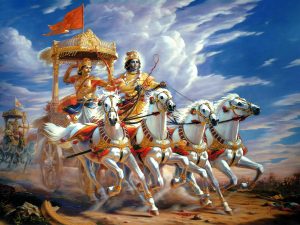The Manhattan Project, spearheaded by Robert Oppenheimer, remains a landmark in scientific history, culminating in the creation of the world’s first atomic bomb. Intriguingly, Oppenheimer’s journey was intertwined with the philosophical teachings of the Bhagavad Gita, a sacred Hindu scripture. This article explores the profound impact of the Gita on Oppenheimer’s life and its influence on his role in the development of the devastating nuclear weapon.

The Manhattan Project: A Revolutionary Pursuit
The Manhattan Project, initiated in 1939, was an ambitious and secretive research program aimed at developing atomic weapons during World War II. Tasked with leading this scientific endeavor, Robert Oppenheimer brought together brilliant minds from various disciplines to harness the power of nuclear fission and construct an atomic bomb.

Robert Oppenheimer: A Complex Figure
Robert Oppenheimer was an enigmatic figure, embodying brilliance and complexity. His Jewish heritage, coupled with a passion for literature and philosophy, shaped his worldview. Oppenheimer’s intellectual curiosity and deep introspection led him to explore the philosophical teachings of the Bhagavad Gita.

The Bhagavad Gita and Oppenheimer’s Journey
Oppenheimer’s encounter with the Bhagavad Gita was a transformative experience. This ancient Hindu scripture, renowned for its profound philosophical insights, captivated Oppenheimer’s mind. Studying Sanskrit and engaging in philosophical discussions, he sought to understand Gita’s teachings, particularly those concerning duty, ethics, and the nature of existence.
The Gita’s Relevance to the Nuclear Dilemma
One verse from the Bhagavad Gita deeply resonated with Oppenheimer as he grappled with the moral implications of his work. The verse, “Now I become Death, the destroyer of worlds,” haunted him, symbolizing the immense power and destruction he had a hand in creating. It reflected the gravity of his responsibility and the existential quandary he faced.
Moral Responsibility and Reflection
Oppenheimer’s involvement in the Manhattan Project forced him to confront the ethical ramifications of harnessing atomic power. Witnessing the devastating effects of the atomic bomb in Hiroshima and Nagasaki, he experienced a profound moral awakening. He became acutely aware of the urgent need for nuclear arms control and the imperative to prevent further proliferation.
Post-Manhattan Project Legacy
Following World War II, Oppenheimer emerged as an advocate for peace and nuclear disarmament. He voiced concerns about the dangers of an escalating nuclear arms race and played a pivotal role in shaping nuclear policy. His experiences with the Manhattan Project forever altered his perspective and propelled him to work towards a more secure and peaceful world.
Impact and Significance
Robert Oppenheimer’s involvement in the Manhattan Project, combined with his exploration of the Bhagavad Gita’s teachings, underscores the complex interplay between science, philosophy, and morality. His story serves as a cautionary tale, emphasizing the need for conscientious decision-making in scientific advancements with far-reaching consequences.

The interweaving of the Manhattan Project, Robert Oppenheimer, and the Bhagavad Gita showcases the fusion of science and spirituality, the dilemmas of moral responsibility, and the profound impact of philosophical teachings on an individual’s path. Oppenheimer’s transformative journey serves as a reminder of the weighty decisions scientists and society face, emphasizing the necessity for an ethical compass to guide progress in the pursuit of knowledge.
Christopher Nolan’s upcoming film, “Oppenheimer,” dives into the life of physicist Robert Oppenheimer and his moral dilemmas during the creation of the atomic bomb. With Nolan’s signature style, the movie blends philosophy and spectacle to explore the interplay between scientific progress and the human conscience. The film aims to provide a deeper understanding of Oppenheimer’s brilliance and ethical responsibilities.
Nolan’s meticulous casting and historical accuracy, combined with his artistic vision, promise an intellectually stimulating and visually captivating cinematic experience. “Oppenheimer” invites audiences to contemplate ethics, science, and the complexities of decision-making in the pursuit of scientific advancement.



